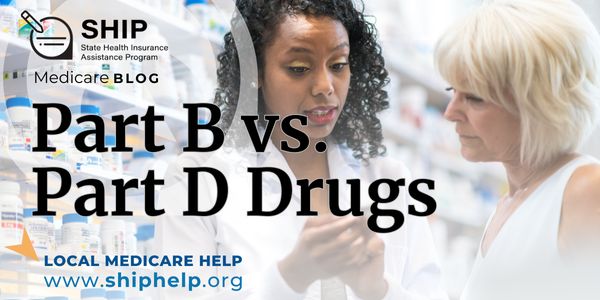Most drugs covered by Medicare are covered by Part D. But in some cases, Part B or Part A pay for drugs. Knowing these rules can help you get your prescriptions with fewer problems. Today we’ll learn some of Medicare’s rules for covering prescription drugs.
When do Parts A, B, and D cover prescription drugs?
- Part A covers the drugs you need during a Medicare-covered stay in a hospital or skilled nursing facility.
- Part B covers drugs administered by your provider or at a dialysis facility where the provider or facility supplies and administers the drugs. Part B also covers some outpatient prescription drugs, mainly some oral cancer drugs used in chemotherapy. Part D cannot pay for any drugs that Part B covers.
- Part D covers most outpatient prescription drugs you get at the pharmacy. Check your plan’s list of covered drugs to learn if it covers your drugs. We call the list of covered drugs a formulary.
Part B vs. Part D drugs
Some drugs may be covered by Part B or Part D. Which part covers your drug depends on what the drug is used for and how it’s administered. For example:
- Injectable drugs: Part B covers injectable drugs if you can’t inject the drug yourself and your doctor provides the drug in their office and injects it for you. Part D covers injectable drugs that you buy at the pharmacy and take yourself. Part D also covers injectable drugs that you buy at the pharmacy and bring to your doctor’s office for them to inject for you.
- Vaccines: Part D covers most vaccines your doctor recommends. Part B covers some vaccines, though. For example: flu shots, pneumonia shots, COVID-19 shots, and hepatitis B shots for certain people. Part B also covers vaccines after you have been exposed to a dangerous virus or disease, such as tetanus.
- Insulin: If you self-inject insulin, Part D covers insulin and related medical supplies. For example, syringes, gauze, and alcohol swabs. Part B covers insulin that you use with a Part B covered insulin pump. Part B covers insulin pumps, related supplies, and the insulin used with these pumps as durable medical equipment.
- Immunosuppressants: Part B covers your immunosuppressants if you had a kidney transplant in a Medicare-approved facility and you had Medicare Part A at the time of your transplant. Part D covers immunosuppressants if you didn’t have Part A at the time of your transplant or you didn’t have your transplant in a Medicare-approved facility.
How to fix issues accessing your medications:
- Know how Medicare covers your drug. Call Medicare to learn about which part of Medicare should cover your drug. Check if your Part D drugs are on your plan’s formulary. Also check for any coverage restrictions, like rules you must follow before your plan covers your drug.
- Ask your pharmacist to submit claims to the right part of Medicare. Your pharmacist could be billing your prescription incorrectly. This could explain a drug coverage denial or why your pharmacist is having trouble with your plan. If your provider doesn’t know how to submit these claims, they can reach out to your plan or to Medicare for help.
- Make sure your provider or pharmacist has the documentation they need. This is helpful for drugs that are covered differently depending on the situation. For example, if Part B should cover your insulin because you use an infusion pump to take it, you may need to show proof that you have an insulin pump.
- Appeal any denial. You have the right to appeal Medicare’s or your plan’s denial. Ask your doctor to help prove your drug is medically necessary and that you meet the coverage criteria.
Finally, be on the lookout for pharmacy fraud.
Pharmacy fraud can happen in many different forms. Here are some examples:
- A pharmacy bills Medicare for a drug you didn’t get.
- A pharmacy gives you a different or less medication than what your doctor prescribed.
- A pharmacy refills a prescription you don’t need without you knowing it. You don’t pick it up, but the pharmacy still bills Medicare and gets paid.
- A pharmacy bills you for an expensive custom pain cream, instead of the cheaper generic one your doctor ordered.
- A pharmacy purposely gives you expired drugs.
- A pharmacy offers you
free
ordiscount
prescription drugs without an order from your doctor and then bills Medicare.
It’s important to look out for pharmacy fraud. Read your Medicare statements to check for errors or suspicious charges. Report potential fraud to your local Senior Medicare Patrol, or SMP.
Still have questions?
Your SHIP is here for you! You can contact your SHIP for any Medicare-related questions or concerns you have. SHIP counselors are government funded to provide trusted, unbiased Medicare counseling at no cost to you. (Depending on your state, your SHIP may go by another name.) Use our online SHIP Locator or call 877-839-2675 (and say Medicare
when prompted) to find your local SHIP.
If you think you have experienced potential Medicare fraud, errors, or abuse contact your local Senior Medicare Parol using the online SMP Locator or by calling 877 808-2468.

